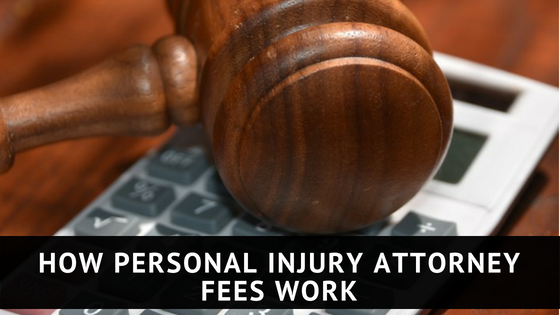
How do you pay a personal injury attorney? Learn the details about their fees and expenses in this post.
If you’re injured, one of your first concerns might be, ”How will I ever afford a personal injury lawyer? Lawyers are expensive, aren’t they?”
Well, yes – lawyers are expensive. But thankfully almost every personal injury attorney handles injury cases on a contingency fee basis. A “contingent” fee means there is no attorney fee unless there is a money recovery and the fee is a percentage of the total amount of money recovered (usually 33.33% but often goes up to 40% depending upon the type of case and whether a lawsuit is required). So, if you don’t get paid then there’s no fee owed because one third of zero is zero. By charging a contingency fee instead of an hourly rate (which is usually many hundreds of dollars an hour) it allows anyone who has a legitimate injury to have access to legal representation regardless of their income. Otherwise only the wealthiest among us could afford to hire a lawyer.
But if you’re thinking of hiring a personal injury lawyer, here are some important things you should know about contingency fees:
- Value – An important tip about value. The best, most successful personal injury lawyers in the country charge fees that are about the same as the least experienced lawyers who have no track record of success in the courtroom. Why? Because they get paid using a contingency fee. What this means to you in terms of value is to understand that while both the good lawyer and the bad lawyer are likely going to charge you about the same percentage – the difference between the value you get can be night and day. While no honest lawyer can ever promise you a specific result, a good lawyer can add value to your case in ways that make it far more likely that you will receive a larger recovery.
- Economics – It’s important to understand that a law firm is a business – and because contingency fees are paid as a slice of the case, accident lawyers tend to fall into two broad categories:
- On one end are the lawyers who only take cases involving the most serious types of injuries, people who’ve been paralyzed, severely burned, or have died. Because these are potentially worth millions of dollars, the lawyer will invest the resources to get the most out the case – such as using focus groups, mock juries and state of the art technology. The more the lawyer can grow the case the more their slice of it will be worth.
- At the other end are the lawyers who take a lot of small cases – these “volume” law practices are often the lawyers you see advertising on television, radio and billboards. These law firms can have many thousands of cases at any one time. And while the payout on each case may not be much, if the lawyer gets enough of them they can make a lot of money. The business model for these firms is not to grow the size of each case, but instead to settle them quickly with as little investment as possible because it’s all about volume.
Unfortunately, this means that a lot of people with real injuries get lost in the middle. The “high end” lawyers won’t take their case because it’s “too small,” but on the other end they don’t want to get caught up in a volume personal injury mill where their real injuries aren’t fully appreciated and their cases are settled for cheap.While there are some very good injury lawyers out there who don’t fall into one of these two broad categories – who will take your case and spend the time and energy to work it up correctly – you need to be aware that most injury lawyers will fall into one category or the other. Read our other post if you want to know the 7 questions you need to ask before you hire an injury lawyer.
- Expenses – Most Personal Injury attorneys in Dallas and elsewhere advance the cost of all case expenses and then recoup them from the money obtained in the judgment or settlement. These expenses can include such things as filing fees, medical and billing record fees, depositions and expert fees. Since these expenses are merely advanced, at the end of the case they are usually deducted from the client’s share of the recovery. Accident attorneys will usually take their contingency fee from the gross recovery and then deduct expenses from the remaining balance.
For example, let’s say you recover $100 in your settlement and your attorney charges a 40% contingency fee: $100 – 40% ($40) = $60 to you. But you also have $10 in expenses, so $60 – $10 = $50. So in this example from a $100 settlement you would gross $50 – but from this amount you would also need to pay any outstanding medical expenses that you owe; the remaining balance would be what you actually pocket (net) from the settlement.But what happens if you have case expenses but you lose your case and don’t recover any money? Because it’s a contingency fee, you won’t owe attorney fees because nothing was recovered.
But do you still owe the expenses? The answer will depend on the contract you sign when you hire your injury attorney. Pay attention to the contract language and don’t be afraid to ask whether you will still owe expenses if nothing is recovered – often case expenses can be many thousands of dollars.
 Jason Franklin is founder of The Franklin Law Firm, a Dallas Personal Injury law firm that specializes in providing Real Help for Real Injuries to North Texas accident victims injured in a car accident, truck accident, motorcycle accidents, or other personal injury cases. Because of his years of experience and record of success, Jason Franklin is frequently invited to speak to lawyer groups about Texas personal injury law. Franklin has been repeatedly recognized by Super Lawyers as being one of the best personal injury trial lawyers in the State of Texas.
Jason Franklin is founder of The Franklin Law Firm, a Dallas Personal Injury law firm that specializes in providing Real Help for Real Injuries to North Texas accident victims injured in a car accident, truck accident, motorcycle accidents, or other personal injury cases. Because of his years of experience and record of success, Jason Franklin is frequently invited to speak to lawyer groups about Texas personal injury law. Franklin has been repeatedly recognized by Super Lawyers as being one of the best personal injury trial lawyers in the State of Texas.